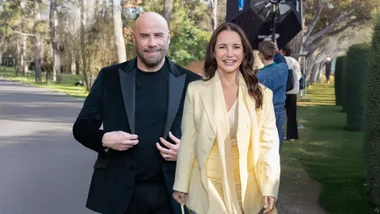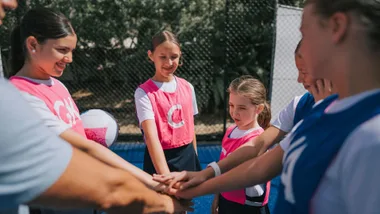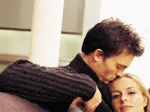Joanna Trollope’s latest novel, Brother & Sister (Bloomsbury) has been selected as the Great Read in the February issue of The Australian Women’s Weekly.
**Q You’ve heard the news that your latest book, Brother & Sister, has been chosen as the Great Read?
A** I’m so pleased! My elder daughter has a wonderful girl from Melbourne living with them for the last couple of years, helping with the children. She’s not just a nanny – far more than that – she’s become a great friend. Her mother sends her Women’s Weekly and we all fall on it.
**Q So you’re very familiar with the magazine then?
A** Yes, and I’m thrilled.
**Q Your book raises the issue of people’s need to know where they come from – what do you think drives that desire?
A** I’m sure it’s a simple matter of being able to see one’s self on the landscape, even if it’s in order to reject that landscape. But to feel one’s self standing alone with nothing behind you, as if on a cliff edge, with only sky behind you, it’s terribly romantic when you’re 14 and we all long to be orphans…our imaginary parents are bound to be more interesting than the ones we got (laughing). But I think when you get a bit older, that’s actually a terrifying thing. You begin to believe you don’t exist. To know where you come from is proof that you do feature, that you are alive. I think it’s just a very primitive proof of existence.
**Q Were you surprised at how strong this urge was in people who have been adopted?
A** What’s so extraordinary is that this is possibly the strongest book I’ve ever researched. Once I’d decided on the theme for a book I then go off and talk to people who are in the situation I’ve alighted on. About 4 books ago I did a book on step-families. I thought I’d unleashed some pretty visceral feelings then. But these ones about belonging and about being rejected, by your mother, are so strong, so primitive, and I couldn’t believe the passion with which people talked to me about it. There was one very distinguished, cool, middle aged male journalist and he stood there in his Portsmouth suit and talked to me for five hours without stopping. With incredible fervour and commitment. So I used to come away from my research sessions needing almost to have a little lie down because people were so fervent. It was extraordinary how much it mattered.
**Q So it was an emotional experience for you?
A** I was very touched because they wanted to talk about it. Talking to novelist who just wants to get the facts right is very different to talking to a journalist who then wants to make something of your story. They were kind of safe, in a way. Obviously it’s an enormous and very valid drama for all of them. There’s a seminal book on adoption written by an American, Nancy Verrier, called The Primal Wound. Her great line is that “the abandoned baby lives inside the adoptee all their lives.” And I would say she’s right.
**Q If that is true of adopted people, is there another truism about relinquishing mothers?
A** Yes, one them said to me giving up a baby is only a whisker away from abortion. Then she went on to qualify this, by saying, “of course with abortion it’s agony and you kill someone, but at least the story is over. With an adopted child, you wonder about that child every day of your life. She said you never ever forgive yourself. That’s why I made carol and Cora in the books so different. Because some women feel terrible about themselves as Cora did. Feel that they need to be punished as Cora did. Others like Carol, try to construct a completely separate subsequent life, as an attempt to obliterate what happened. Of course you never do. It was interesting talking to a lot of adoptees who’d traced their birth mothers. When they’d first spoke to their birth mothers on the telephone, an enormous number said “what do you want?” As if they felt threatened.
**Q You found the adoptees very open and eloquent – what about the relinquishing mothers?
A** No, the reverse. Some were but some wanted to really beat themselves up about it. So many of them felt so awful and always would and were finding they had developed all kinds of extraordinary mechanisms to try and cope with this. And some agreed to see me and then couldn’t say anything. You could see that you were stirring up anguish for them. And some were quite tough and you could see that was a coping mechanism for them. Terribly interesting too that the adopted mothers started off in the physiological role of the saviour. The birth mother was the wicked one, the child was the victim, which it remained. Then when the child wants to find the birth mother, if the adoptive mother does the smallest thing to try and obstruct this meeting which she is so terrified of, she immediately is cast in the wicked role.
The other thing which isn’t mentioned much in the business of adoption is what it feels like to be infertile. It’s come up in the UK hugely at the moment, there’s just been a BBC series about adoption and people keep saying to me why has it come to everyone’s notice? My theory is that the last generation that was treated as a shameful bundle, bringing disgrace on a family by having a baby outside wedlock, is really mine. People in their fifties and sixties. And their children are in their late twenties, early thirties. Because people are having their children much later in life, that generation are having their babies now and having a child is a classic trigger for an adoptee to want to go find their biological mother. And of course they are the last generation who were given up because society has become so much more liberal in the last quarter of a century – thank goodness.
**Q In another ten years, with the low rate of adoptions, you wouldn’t be able to write this book?
A** No, I wouldn’t. In a way, quite by chance I’ve come upon an extraordinary moment. Also, the generation which was appalled to find itself pregnant out of wedlock is the same generation that couldn’t talk about infertility either in men or women. And that of course, people never ever get over, that they cannot conceive. And I think that’s an abiding grief. Particularly for women. And those adoptive mothers, are all menopausal or post-menopausal and their last chance has gone so it really is, as you can see, a seething pot.
I do believe so much in the power of the unconscious mind. Why should I decide to write about this now? And it turned out to be so topical and so passionate! As you say, if I left it another ten years it would be too late.
**Q You must have needed a glass of wine when you got home after doing these emotional interviews?
A** There was a lot of walking the dog. I have a flat in London where I am now and I have a cottage in the country where the dear old Labrador is. (He would hate London). And there were very many walks with Max. He’d plod along and you could see him thinking, ‘blah, blah, blah, let her get it off her chest.”
**Q Did any of their stories make you cry?
A** In a funny way it went too deep for that. The people who I interviewed who gave me the idea for Cora in Brother & Sister, the people who felt they had let everybody down – there was one woman who’d been raped by her father’s best friend, who was very vulnerable and child-like, and a little person. She gave me the idea for Cora’s physique, it went too deep for tears, you were just in a kind of despair for her. She’d never had a chance. And you know, if she’d been born ten years later this never would have happened and would not have blighted her the way it did. No, there were some very lump in throat moments, but some of the time one was in absolute despair about humanity’s cruelty to itself, really. And the thing that really disgusted me in all the research – and I think this is a pretty British quality – the British are pretty bad at distinguishing between respectability and decency. Decency, we’re all for. Respectability is a horrible, cramping, suburban, shallow quality. It’s about looking in a particular way to your neighbours. It’s so intolerant. And of course there was the first world war in Britain and the 50’s and 60’s and 70’s, never mind what was going on in this mythical swinging London (I’ve never met anybody who was a part of it). There was this awful suburban gentility going on everywhere else which inflicted such misery on people who fel into what was deemed transgression through no fault of their own. And were often too young to know what they were doing. That really made me incredibly angry in retrospect. You can still see it in the British, you can see it in their lapping up of the tabloid press. They want to see celebrity transgression in order to click their teeth about it. It’s a horrible quality.
**Q I think everyone from that period remembers a girl at school who had to leave early and would also agree that there were very many were simply lucky they didn’t get pregnant?
A** Don’t you remember one’s abiding obsession as a schoolgirl and then adolescence was with not getting pregnant? You waited every month didn’t you for the curse to arrive with bated breath.
**Q I read also about your observation that whilst there’s no great social stigma these days about being adopted, it still marks you as different, as a bit of an outsider?
A** Adoptees, although when you get them on their own you can’t stop them talking, a lot of them in the workplace won’t say they are. One in 25 of women of a generation – our generation – have given up a child for adoption. Which means that in most gatherings of over a couple of hundred people there will be somebody adopted. When I quoted those statistics at my publishing sales conference, there was just a momentary chill, and I know I didn’t imagine it. It meant that somebody at that conference thought “I am” (adopted) and “I wonder if the people either side of me know?”
People will tell close fiends, but they won’t make a thing of it. There is a feeling of separateness, of not quite joining the human race. It is unbelievably sad. Almost all of the adoptees I spoke to – and I think this is extremely telling – said that they knew they had problems with intimacy. They knew they’d never be able to make the ultimate surrender to another human. The original trust was not so much as broken as never built at birth. So they didn’t know how to do it. A lot had lived very untidy emotional lives. They walk away from things quickly when things begin to go wrong to stop the tables being turned. It was riveting. For a time I got absolutely obsessed by it.
**Q Over what period of time did you do the research?
A** The writing of a book is about the same as a baby – about nine months. I suppose I did about 3 months research before I started writing and then it went on during the writing because I’d come up against something and I’d have to verify it with someone who’d had the experience. Because my aim is to get it as accurate as possible for my readers, particularly for adopted readers. So the research for this one was ongoing throughout the book. I had a wonderful contact – an adoption search agent who finds people’s birth mothers. She does it mostly on the internet and she was invaluable in finding me people to talk to.
**Q I was thinking that with the divorce rate, adoption, sperm donors, gay parents, step families, single mothers – family life has never been more complicated?
A** You’re absolutely right because when I was writing Other People’s Children, I was thinking there’s probably no more step children now than there was in the nineteenth century. But there’s now so many variations on parenthood. Maybe it’s just more tribal? In tribal societies children aren’t brought up by two parents, they’re brought up by a whole village, aren’t they?
**Q True, except we don’t have villages any more?
A** Don’t you notice in our children’s generation that they’ve made families out of their friends, in a way? That they’re in contact with their friends in a way that we weren’t? I look at the young now, people in their late teens, early 20’s, they’re friends are everything. So it’s almost as if they have a sense that they need this community of people because their families are so odd and fragmented.
**Q Do you think the old fashioned family model of two parents, was better equipped to raise happy, well balanced children or do you think the ‘happy family’ is a bit of a myth anyway?
A** I think it’s a bit of a myth. When I did the research for the last book, Girl From The South, I was contrasting rather independent but neglected young people around Bridget Jones’ age, these dysfunctional families in the UK, with the very settled, God- fearing, establishment- respecting families in the deep south in the old confederate states in America. Contrasting some young people in London with some young people in Charleston. And when I went off to do the research in South Carolina I was expecting to be politically horrified, which I was, with no trouble at all and also to be very admiring of this extremely nurturing, supportive network. And actually I came away appalled by how stifling it is. And that the young people, although very respectful and went to church and never forgot their grandmother’s birthdays, were curiously naïve compared to the more neglected young people here. And maybe because the society in the southern states is a bit beleaguered, it’s become a bit concentrated, exaggerated, but I think as long as there are enough people in your family who you know love you and will support you to the death, it doesn’t have to be your parents and siblings. Could be an aunt or a grandparent. I think it’s quite important yo have your mother on your side if you can. I’m sure you need to have 2.4 children and a dog and a front garden – do you know?
**Q I was also thinking that part of this book is about how bloody difficult it is to be a parent – either biological or adoptive?
A** I think it’s become more difficult because there’s all this literature about how to do it! When my children were small there was Dr Spock which you went to if your children had a rash on their bottoms, and Penelope Leach about their behaviour and the rest you did out of your own anxious incompetence. And now there are how-to books in every way and your obligation to be a wonderful wife, lover, career woman, mother is extraordinary and I think it’s quite anxious for modern, young parents.
Funnily enough, it’s the only relationship in the world, except for the one you have with yourself, that you’re stuck with. Once a parent always a parent, I think. I agree, I think it’s better just to do the best you can. I think it is incredibly important, even if you’re critical of their conduct, that you are basically on their side, forever – despite everything.
**Q I was thinking that with all this research and interviewing you do to prepare for a book, that you are part journalist, part author?
A** Yes, but you have to remember that in the early days when I was first writing novels and making absolutely no money, I did lots and lots of journalism. Instead of being interviewed when this book is born in Britain in February I will do a piece on the research for the broadsheet. So I’ve had that experience, although I wasn’t trained as a journalist. And I suppose because I started my novel writing career writing historical fiction I was very used to research. Possibly I would feel a bit anxious with out it. feel a bit draughty.
For the Rector’s Wife I went to work in a supermarket because when I was a student there weren’t any supermarkets to work in. We worked in bars and other such places. But I had no idea what it was like and if I was going to give my heroine her first fledgling job in one, I had to know what it was like. And that was really the beginning. I found it gave me incredible confidence. And readers seem to like it. they appreciate feeling they’re on solid ground.
**Q Readers know if it’s not real – they can scent it in the writing?
A** One has to remember that readers often know far more about what you’re writing about than you do. Never ever underestimate readers.
**Q In between the research and beginning to write do you allow a period where you allow what you’ve learned to sit there and seep into your brain?
A** Not really, because that’s happening as I go along. By the time I get to the end of the research I’m really fired up, ready to put it down onto paper. I then do a bit of rough plotting. It’s not like plotting a crime novel, but I will nut out the first 5 or 6 chapters of the book, to launch it and then I will plot the end so that I know where I am going but I don’t know how I am going to get there and that allows the book to evolve in an organic and arbitrary way.
**Q Do you disconnect from the rest of the world when you’re writing?
A** Yes I do. It’s odd. I get terribly tired, the way you’d feel at school during exams when you did three in a day? A day’s writing can leave you feeling like that. And then it has to be slumped in front of neighbours on the tele, you can’t do anything further.
**Q I don’t believe you slump in front of Neighbours!
A** I love soaps, anything with a narrative in them.
**Q I’ve read you’re not like many other writers who will put off writing for as long as they can, you are actually very disciplined, aren’t you?
A** It doesn’t mean I don’t suffer from that feeling. I do. I dread not being able to do it again. But I have learned the only way to feel better is to sit down and try. Yes I am disciplined. I set myself so many thousand words a week and if I have a day when I do something else I make myself make up for it. So it’s pretty focussed. But it ought to be! It’s a profession, you can’t treat it as an idle hobby. It’s got to be taken as seriously as any other job.
**Q Do you work more in the city or in your home in the Cotswolds?
A** London is easier because there are fewer interruptions. In the country there’s…people. A lovely lady who’s helped clean the house for 20 years, there’s a chap in the garden and my lovely PA and people ringing the doorbell….”Ooh! Are you writing?” London, I can be much more anonymous. I don’t have any help of any kind in London, deliberately. Sometimes it’s just wonderful knowing there’s a blank, empty day. And I’m not going to be interrupted. Nobody’s going to come and tell me “there’s no Hoover bags”.
**Q Any nice love affairs or relationships in your life?
A** All I can tell you is that I’m having a very nice time. I am living alone but I’m not always alone. It’s a very good stage of life, I think, if you’re a woman of independent means – and I emphasise that, I’m well aware of how much difference it makes having enough money – it’s a very good stage to be on one’s own. In wouldn’t say this if I hadn’t had family life and children and that will always come first. And I’ve been on my own now for quite a long time now, about 5 or 6 years and I find whenever a relationship approaches anything that even smacks commitment I’m like a modern young man of 20 and I bolt! I don’t want this wonderful freedom curtailed. I don’t want someone saying why can’t I see you this weekend and I say because I’m looking after the grandchildren. That’s what I want to do. I hope this happy stage lasts. But I have to say it’s very nice.
**Q Could you nominate a positive and a negative about being a successful and a famous writer?
A** A positive without any hesitation is the readership. It’s absolutely incredible and the amazed, touched, delighted, warmth it generates in me never diminishes. When I was in Sydney earlier this year, when I walked into that ballroom in the hotel and found it completely full…there isn’t a positive to equal that. And lots of them, I knew had driven for hours and made arrangements to be in Sydney and then it was repeated in Brisbane. That readership response is just something I will never ever get over. Or ever cease to be humbled by and grateful for, it’s wonderful. The downside? Well I’ve had some very unpleasant brushes with the media and even I can take the media making unpleasant stuff up about me and promulgating it, but I do mind deeply on behalf of my innocent family who get dragged in, get mentioned. I really hate that. It’s all very well to attack someone who’s visible but my mother’s been door stepped by the tabloids! They were looking for a non-existent toy boy. They thought she might be harbouring him. Keeping him warm for me! It doesn’t happen to me all the time and I owe the media a very great deal. There are some simply wonderful journalists who have made a significant difference to my career.
**Q You write with great heart and compassion and I was wondering if anyone in particular instilled those qualities in you?
A** No particular person. During my life it’s been a raft of people who haven’t let me down. I would certainly identify an enormous number of other women. Not just family. I just had a fairly significant birthday and my daughters are organising for me next Saturday a lunch for 20 women from every stage of my life who have remained very close friends. So they start with somebody who was my sister-in-law from my first marriage and I’ve known her since she was four. And I’m godmother to one of her children. And somebody from when I was a teacher, she was my first A level student and she’s still a friend. It’s these milestone women, (I could honestly have had fifty but I had to choose just the 20) and their loyalty. The thing about them not being family is that they have chosen to stay close to me. Of course I now know all kinds of celebrated people, but my circle of friends who I rather rely on, have been the same for 30 years. So I think if there is an answer to your question it lies very largely with them.
**Q How many grandchildren do you have?
A** Two of my own. My eldest daughter has two little things and my eldest step-son who I’m very fond of, and very close to, he has two little things too and I am a kind of honorary grandma.
**Q Is being a grandmother a good experience?
A** It’s staggering. I couldn’t believe how wonderful it was. You sort of feel your purpose one earth has been completed. You’ve produced a child who’s produced a child. Fine, don’t need to write another book really (laughing). I absolutely adore it.
**Q How old were you when you read your first Anthony Trollope book?
A** Oh, quite old. I was an under-gradiate,19 or 20. I refused too as a teenager – I took one look and thought how old fashioned!
**Q Which one did you read?
A** I think it was Miss Mackenzie, it’s a brilliant story about a woman who comes into money and how people react differently to her.
**Q Thank you very much for your time.
A** I am so thrilled the magazine has chosen my book – I have such a soft spot for Australia. I love coming there. This particular choice means more to me than a lot of the others. I am really touched. Please give my love to the staff at The AWW and to Sydney! I wish I was there.
Newsletter conversion description. Get the latest in your inbox.




























